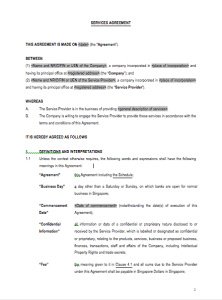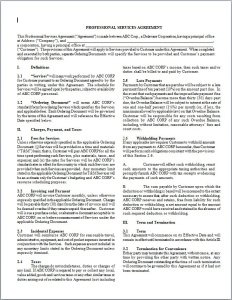
Advisor Agreement templates Start the discussion!

Advisor Agreements
Hiring an advisor for your company can make massive improvements on how your business operates. Receiving external, objective advice can help your business achieve greater things, at a faster speed, by harnessing the counsel of others. However, in a professional environment it’s in everyone’s best interests to formalize the relationship so that everybody knows what is expected of them.
Sometimes, sharing equity among your employees and advisors is a good method of boosting motivation. To issue shares to an advisor could be a good way to develop the professional relationship. However before thinking about shares or options, it’s important that the basics are laid out first. For example,
-The role of the advisor?
-What type of advice will she be providing?
-How many hours will she be expected to work?
-Payment?
After these questions have been answered, it will then be appropriate to discuss options or shares. It will also ensure that everybody involved is aware of their responsibilities and expectations.
Important Elements of an Advisor Agreement
Services:
Advisors will agree to act as mentors for the business and advise on matters that have been outlined in the agreement. What is expected of an advisor must be contained within the agreement and discussed in detail with the employer. There should be an element of flexibility included within the agreement so that if the advisor is asked to perform more work, there is some leeway to do so.
It usually depends on whether or not an advisor is entitled to monetary compensation. Advisors are commonly given a small amount of equity or shares as a means of compensation which must be outlined in the agreement. Normally, companies will discuss between the Board of Directors to decide upon the amount of compensation that the advisor will receive, with the aim of obtaining written approval. The advisor must buy these shares at face value instead of at the rate which investors or other buyers pay.
Some companies will sometimes even set up a board of advisors; however this isn’t classed as a legal body. This isn’t necessary and purely optional. It’s set up so that credibility and social proof of the startup is enhanced. It’s not obligatory to state this in the advisors agreement.
Expenses
Whilst working for the company, the company shall reimburse the advisor for reasonable travel expenses incurred. The advisors agreement should outline details of how this will work, and the limit of reimbursement. It should also enclose details about the time and the method of how they’ll be informed about the expenses.
Term and Termination
Duration of employment and method of termination should be outlined in the agreement. Sometimes it’s not certain for how long the advisor will be with the company, so generally the contract is terminated when the advisor no longer adds value. In this way, it is a good idea for the company and for the advisor to agree upon a notification period in which each party will have to give a notice before a certain number of days before the contract is terminated. Independent contractor.
It should be noted in the agreement that an advisor is not directly employed by the company. He or she is an independent body working with the company for a limited duration of time and for a specific purpose. Therefore, no company benefits should be extended to the advisor. Awareness of these details will facilitate the relationship as the role of the advisor is clear.
Nondisclosure of confidential information
Non- Disclosure of confidential information should also be included within the advisor’s agreement. This is so that any confidential information about the company is not disclosed to third parties by the advisor. It should also be noted that by respecting this part of the agreement, he/she is agreeing to keep the secrets of the company to the best of his/her ability. Returning of certain company documents upon termination should also be noted.
Intellectual Property
It must be emphasized within the advisor’s agreement that the advisor does not have any rights to the IP of the company; he/she only has access to it when necessary to carry out the necessary advisory services.
Avoiding conflicts
An advisor agreement will usually also state that, in order to avoid conflict, the advisor should not violate any duties he may have with another company.
So in conclusion, the aim of advisor agreements is to avoid conflicts and ensure clarity throughout the duration of the contract. This should enable a successful and professional employment relationship.
If you'd like to read more on advisor agreements, visit
Most popular templates
 A template for a Service Agreement to bring a Service provider on-board.2,366Discussadd_shopping_cart$79.00
A template for a Service Agreement to bring a Service provider on-board.2,366Discussadd_shopping_cart$79.00 by Singapore Legal Advice
by Singapore Legal Advice

Advisor Agreement Templates for UK & Hong Kong
Annotated to help you, these are Advisor Agreement Templates; one for the UK and one for Hong Kong.544Discusslibrary_addfree by Seed Summit
by Seed Summit

Extended Team Member Agreement/Engagement Agreement
An agreement template for an external consultant being hired into your company.580Discusslibrary_addfree by Startup Commons
by Startup Commons

Founder Advisor Standard Template
Used to help entrepreneurs establish advisory boards, engage with mentors, and trade support & advice for equity.1,560Discusslibrary_addfree by Founder Institute
by Founder Institute

Consulting Agreement Template
Template for use if your business provides consulting services to other businesses.1,428Discusslibrary_addfree by Mukund Mohan
by Mukund Mohan

Consultant or Contractor Agreement Template
Template for use if your company would like to hire a consultant or contractor.640Discusslibrary_addfree by Mukund Mohan
by Mukund Mohan








